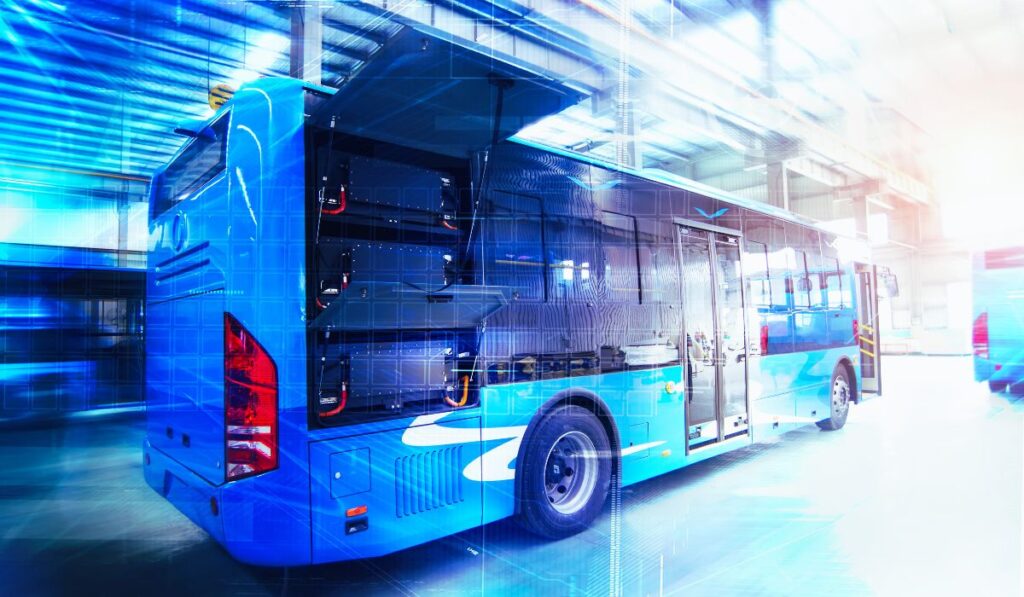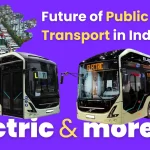
Electric buses are emerging as a popular sustainable and eco-friendly transportation solution around the world and India is nowhere left behind. Electric buses for public transport are seeking more attention and are on the verge of changing the traditional trends of transport. Electric bus is a new and developing sustainable evolution in the era of transportation. Zingbus is taking a step ahead in the evolution of sustainable travel with electric bus services.
Technology Behind Electric Bus
At the heart of the electric bus revolution are two main types: battery electric buses and hybrid electric buses. Fully battery electric buses BEBs are propelled solely by electricity stored in rechargeable batteries within the bus and emit no local air pollution.
Hybrid electric buses (HEBs) use a mixture of electricity and internal combusting engines hence they are flexible and have more range than exclusively electric buses. It will be necessary to get used to the Electric buses as this is a relatively new type of transport.
Some of the critical assemblies of charging infrastructure of electric bus equipment include battery electric bus, motor, inverter, power control, and motor control. These electric bus components coalesce to offer a sustainably clean, effective, as well as ecologically sound system of transport.
Electric Buses vs Traditional Buses
Operational Costs
Electric Buses: It is noted that the operating cost of an electric bus is averagely estimated to be $0.20, compared to $0.50 for a diesel bus Fully built-up chassis weigh approximately between 5700 to 7300 kg while fully built-up chassis with a CNG bus weighs between 7400 to 8000 kg. This means that on average in twelve years of its use, the electric bus would have saved up to $ 400, 000 in fuel expenses.
Traditional Buses: A conventional diesel bus will cost up to $0.07 per kilometer in consumption cost although the cost can reduce with advancements in technology. 50, which as it is seen, makes it more costly to run than electrical buses.
Maintenance Costs
Electric Buses: The electric bus requires $0 on average to maintain annually due to the fewer number of parts that the bus is fitted with $10 per kilometer.
This also means that there are reduced parts and components that break down often especially since the internal combustion engine is not required in the electric drive train.
Traditional Buses: The annual maintenance cost that is estimated for a diesel bus is close to $0. 20 per kilometre.
Environmental Impact
Electric Buses: One diesel bus displaced by an electric bus would result in a saving of about 45,000 kg of CO2 emissions annually. Regarding efficiency electric buses are 85 to 90% efficient which means the amount of energy passed through the battery to the bus while the electric energy that diesel buses use is only 20 to 30% efficient much energy is wasted in the form of heat.
Traditional Buses: Buses that rely on diesel fuel lead to the emission of gases affecting the atmosphere and also greenhouse gasses. A diesel bus releases, on average, 150,000 kg of CO2 per year.
Total Cost of Ownership
Electric Buses: While electric buses are expensive to acquire ($750,000) for the initial purchase while diesel buses are cheaper at $500,000, the overall cost of owning the bus is lower for the former because of the cheaper cost of electricity together with the lower amount spent on maintenance. Subsidy and incentives provided by the government to electric buses also help in decreasing the expenses of transport authorities.
Traditional Buses: Generally, however, frets using diesel are slightly more costly to purchase than utilizing sectional frets and subsequently they cost too much to use because they consume more fuel and require more frequent maintenance services. The overall cost of a diesel bus spread over twelve years is stated to be about twenty percent more expensive than an electric bus.
Thus, it has been unanimous from the undertaking of the costing analysis of the electric buses relative to the diesel-fuelled buses to arrive at the conclusive realization that electric buses have a comparative advantage over the latter.
Whereas, electric buses are relatively expensive to purchase but have cheaper operational costs for their services and less pollutive than the normal buses. Cities can, therefore, cut costs and attain the extra advantages of electric buses in the decrease of emissions on the environment, which is a better and sustainable mode of transport and an imperative move towards the future.
Advantages of the Scheme to the Environment and the Passengers
There are great advantages if the electric bus is used. They assist in the emission reduction electric buses since they do not emit exhaust emission reduction electric buses thus enhancing the quality of air and health status of people in cities. At the same time, this is especially imperative for comparatively concentrated regions and large cities of the Union of India.
Consumers also stand to gain several advantages with electric buses among them. The efficiency of the operation is less noisy thereby lowering acoustical pollution in comparison to the conventional buses.
Better acceleration rates and reduced vibrations are beneficial for the comfort and safety of the passengers. Also, electric buses can be known as operating cost savings electric buses as they are driven with reductions in fuel costs and maintenance costs form conventional diesel buses.
Limitations
Nevertheless, there are some difficulties that electric buses have. The main disadvantage is high usage costs, especially the initial investment; this is mainly attributable to battery costs and a corresponding substructure.
The establishment of charging infrastructure for electric buses is challenging because it is capital-intensive and calls for careful planning, particularly in the aspect of charging technology. Another challenge is the range of the battery electric buses where battery technology restricts the distance electric buses can cover against diesel buses. But constant innovations are enhancing the range as well as the efficiency of the available systems.
Government subsidies for electric bus
Through the provision of these incentives, governments of the world including the recently identified India encourage the usage of electric buses. These include government subsidies electric buses purchase, tax exemptions as well as the provision of incentives on the improvement of charging infrastructure of electric bus facilities.
The prospects for electric buses in India’s market seem quite favorable. With improvements in battery technologies electric bus range is increasing hence the buses can be used on longer routes. The future of electric buses in India is more driven toward sustainability will bring forth an even more efficient and better electric bus range shortly.
Future trends and predictions of Electric Bus in India
India’s electric bus market is ready for considerable growth backed up by technology and governmental policies in the country. The future trends suggest that batteries are going to severe more efficient and longer lasting. Technologies like solid-state batteries and sophisticated energy storage systems will be to optimize the ranges of electric buses and shorten the charging periods.
Self-driving options could also be applicable to electric buses to enhance safety and functionality. Also, the charging infrastructure for electric buses will have investments such as fast charging stations and wireless charging capability.
As for the policies, various targets of the Indian government to promote green mobility are expected to be sustained: subsidies for electric buses, tax credits, and enhanced emission standards for conventional cars. It will extend schemes like FAME (Faster Adoption and Manufacturing of Hybrid Electric Bus and Battery Electric Bus) according to which financial assistance will be given for the purchase of electric buses and to building up the necessary support system.
The governments, manufacturers, technology partners, and urban transit authorities are expected to be involved in new public-private partnership models to drive the electric bus adoption to its next level. These advancements and policy measures will foster the growth of the electric bus market and place India on the map of green mobility for the urban population.
Conclusion
Thus, electric buses play a significant role in addressing the problem of urban transportation as they can provide the following advantages fuel saving, equipped charging system, comfort and quiet, smooth accelerations, and cost savings.
Some of the weaknesses may include high initial costs, infrastructure development, etc., but seeing the continuous innovation in those electric buses and the support from the government subsidies, it appears to have a very bright future in India.
Therefore, the adoption of electric buses will be a big plus for India regarding emission reduction electric buses and quality living standards setting the stage for a cleaner future.
With the online bus booking platforms, now is the time to go with the flow and advocate and promote the use of electric buses in the country, India. In this way, online electric bus have driven collectively, with which we can achieve a sustainable future with a lot and change our world to make it a better place to live in.






Leave a Reply